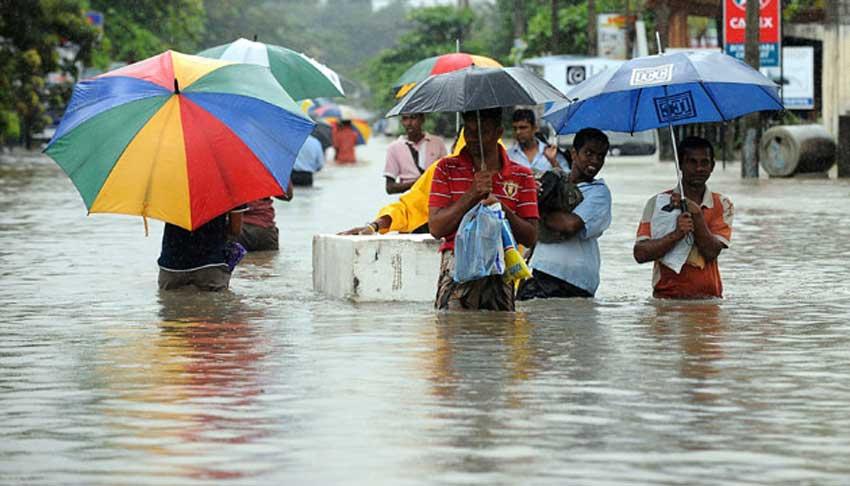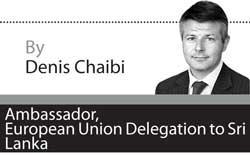Reply To:
Name - Reply Comment
Last Updated : 2024-04-25 00:00:00
 Sri Lanka spends annually some Rs.50 billion as relief assistance for damage to housing, infrastructure, agricultural crops, businesses due to floods, droughts or storms.
Sri Lanka spends annually some Rs.50 billion as relief assistance for damage to housing, infrastructure, agricultural crops, businesses due to floods, droughts or storms.
 As the world grapples with the outbreak of the Covid-19 pandemic, and starts to gradually prepare to deal with its long-term impacts, the very real threat of climate change – possibly the greatest threat that mankind faces -- did not disappear. Governments and societies should take a moment to reflect on what we can learn from this crisis, draw parallels with the overhanging threat of climate change and use these lessons to build a better future.
As the world grapples with the outbreak of the Covid-19 pandemic, and starts to gradually prepare to deal with its long-term impacts, the very real threat of climate change – possibly the greatest threat that mankind faces -- did not disappear. Governments and societies should take a moment to reflect on what we can learn from this crisis, draw parallels with the overhanging threat of climate change and use these lessons to build a better future.
With more than half of the global population in lock-down, the first lesson learned is the deep inter-dependency among our countries and regions and the high exposure that we all have had to unanticipated external shocks. With the virus spreading uncontrollably from continent to continent, it has been those governments that have accepted responsibility for the well-being of their citizens and come out with a clear plan that have weathered the test. Sri Lanka can be proud to fall into that category.
In its Biodiversity Strategy to 2030, the EU has also made major commitments on protecting and restoring EU’s ecosystems and is ready to lead efforts to agree an ambitious new global biodiversity framework for post-2020 at the upcoming COP15 on Biological Diversity
The second lesson is that multi-lateralism and global solidarity work. Many governments have joined forces to set up coordination and information sharing mechanisms and mobilised assistance to the most affected and the particularly vulnerable, effectively saving lives and livelihoods all around the world. The third lesson has been the necessity to accept science and respond to it. And lastly, while the poorest maybe the most vulnerable to the long-lasting impacts, the crisis spares none.
And this is where we come to climate change and environmental degradation. Covid-19 in 2020 is an exceptionally large-scale human tragedy, and similar outbreaks can be expected in the future, but science tells us that this is just a warning compared to the existential risks for our civilization associated with global warming and other planetary challenges in the years to come. Sri Lanka is extremely vulnerable to climate change and in 2019 was ranked the 2nd most vulnerable country in the Germanwatch Climate Risk Index.
For such vulnerable countries, the cost of climate change is very tangible and very evident. Sri Lanka spends annually some Rs.50 billion as relief assistance for damage to housing, infrastructure, agricultural crops, businesses due to floods, droughts or storms. There also exists increasing evidence that many new infectious disease outbreaks are increasingly triggered or accentuated by the impacts of global warming or by ecosystem degradation.
Healthy natural ecosystems are a prerequisite for continued prosperity and Sri Lanka is fortunate to still have quite a few of these. Unaddressed climate change – if the international community fails to bring the increasing greenhouse gas emissions down – environmental degradation will lead to catastrophic consequences, including making large parts of our planet uninhabitable in the coming decades. Similarly, the growing number of violent weather phenomena will continue to destroy crops, homes and infrastructure, trigger massive wildfires and induce mass migration. These are ingredients for a very unsettled world.
Global warming is harder to tackle than the Covid-19 pandemic. There will be no vaccine against climate change and its devastating impacts. Flattening the emissions curve will only be possible if we together take bold and courageous action to mitigate climate change. The good news is, we can do it and we can – in fact, must – and use the economic rebound from Covid-19, to accelerate the transition to a safer, more resilient future.
The choices we make today will define tomorrow’s future. Over the next two years, governments around the world will seek to spend around EUR 10 trillion borrowed from future generations. The massive investment needed to kick-start our economies must relieve the burden on their shoulders, not make it heavier. We need to get it right from the word go. This is why the recovery plans should be designed as a once-in-a-generation opportunity to ‘build back better’ and invest in an economy of the 21st century, and not in the obsolete carbon economy of the past century.
The European Union (EU) has reconfirmed its commitment to a green, digital and resilient recovery and embedded it in its proposal for the EU’s recovery plan released at the end of May. Through our recovery plan called. ‘Next Generation EU’ and a revamped EU budget, every euro of investment will be made available to get Europe back on its feet, while accelerating the twin green and digital transitions and building a fairer and more resilient society. Moreover, the Commission has proposed for 25% of the EU budget for the next seven years to be spent on climate investments. Some areas where strong action can lead to big impacts are, for instance, the circular economy, ecosystem restoration, the built environment (renovation), mobility (electrification), and energy (renewables and clean hydrogen).
The EU will stick to its goal to be climate neutral by 2050 – and we challenge anyone to beat us to it so the whole of humanity wins.
In its Biodiversity Strategy to 2030, the EU has also made major commitments on protecting and restoring EU’s ecosystems and is ready to lead efforts to agree an ambitious new global biodiversity framework for post-2020 at the upcoming COP15 on Biological Diversity. Sri Lanka has one of the richest bio-diversities in the world.
Global solidarity, open and fair trade, rules-based order, and multi-lateralism are crucial to avoid lapsing into a fossil fuel and resource intensive recovery, which would put people and the planet irreversibly in peril. We urge all international partners, and in particular Sri Lanka and its citizens to also put in place clear and robust low carbon policies and green recovery strategies. Sri Lanka is doing a lot already but more is necessary. This will give our societies a sense of direction and purpose, and guide investors, businesses, workers and consumers towards sustainability.
The EU stands ready to engage with partners around the world on ways to direct investment to environmentally sustainable economic activities. We have a number of grant-funded projects in the pipeline. For instance, a project to reduce the emission of industrial greenhouse gases in Sri Lanka and thereby enable the Government to achieve its international pledges towards carbon neutrality is now ready for implementation, and is awaiting the final signature of the new Sri Lankan Government to begin implementation.This project will also bring tangible benefits to the private sector by helping industries to become more competitive and recognized as environmentally compliant, thus enabling access to EU and global markets. Similarly, the EU is ready with a food safety project, which will take into consideration climate adaptation issues which affect food production. The EU is available to share expertise, finance projects, explain our regulations and share our principles for sustainable finance. We are working hard to find new ways to win this collective challenge and to allow our children to enjoy a decent human life on a peaceful planet is not an idealistic or a naïve pursuit. It is about staying true to our values, listening to science, strengthening our economies, and building a better future. There simply is no realist alternative to green recovery and we must share responsibility if our children are to survive the biggest threat to their future.

Add comment
Comments will be edited (grammar, spelling and slang) and authorized at the discretion of Daily Mirror online. The website also has the right not to publish selected comments.
Reply To:
Name - Reply Comment
US authorities are currently reviewing the manifest of every cargo aboard MV
On March 26, a couple arriving from Thailand was arrested with 88 live animal
According to villagers from Naula-Moragolla out of 105 families 80 can afford
Is the situation in Sri Lanka so grim that locals harbour hope that they coul